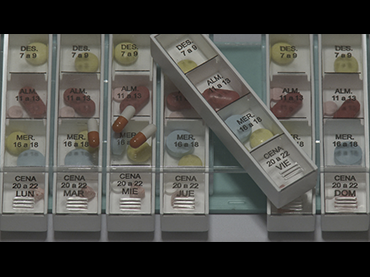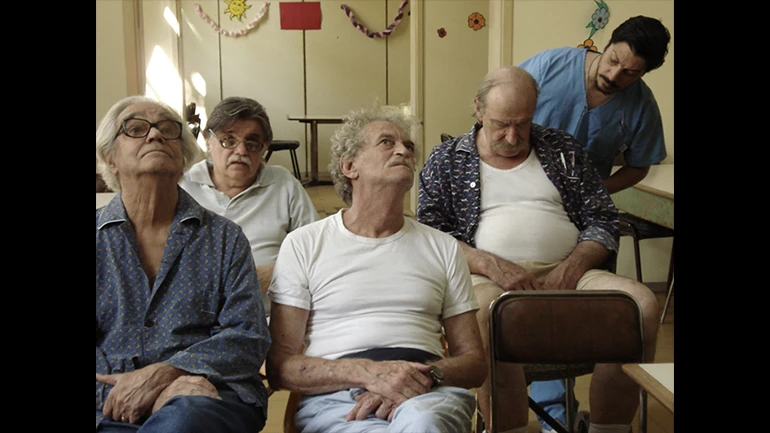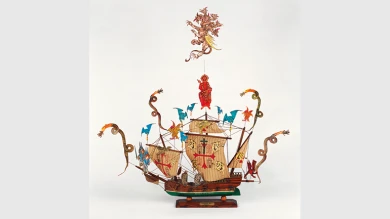-
Wednesday, 16 December 2020 – 6pm / Nouvel Building, Auditorium 200 Nouvel Building, Auditorium 200 and Online platform
Session 1
Second session: from Friday, 15, to Wednesday, 20 January 2021 / Online platform
Rubén Guzmán. Civilización. Un documental sobre León Ferrari (Civilisation. A Documentary About León Ferrari)
Argentina, 2012, original version in Spanish, DA, 56’Encounter with the curatorial team of the exhibition The Kind Cruelty. León Ferrari, 100 Years
Participants: Fernanda Carvajal, Javier del Olmo, Andrea Wain and Julieta Zamorano Ferrari
With the collaboration of: illycaffèThe opening session of the series begins with the screening of Rubén Guzmán’s documentary about León Ferrari. As the artist himself would say in a phrase read by the actress Cristina Banegas in the film, “I think our civilisation is reaching the most refined degree of barbarity ever recorded in history”. This thinking, linked directly to today’s world, is stressed with the accent the director placed on the artist’s shift towards politics through his work La civilización occidental y cristiana (Western and Christian Civilisation, 1965).
The screening will be followed by an encounter with the exhibition’s curators — Fernanda Carvajal (researcher), Javier del Olmo (architect, artist and curator) and Andrea Wain (teacher)— and Julieta Zamorano Ferrari, León and Alicia Ferrari’s granddaughter. The conversation looks to contextualise the life and work of León Ferrari on the centenary year of his birth, as well as engage in dialogue with the exhibition.

-
Thursday, 21 January 2021 – 7pm / Sabatini Building, Auditorium Sabatini Building, Auditorium and online platform
Session 2
Second session: from Friday, 22, to Wednesday, 27 January 2021 / Online platform
Fernando Birri. La primera fundación de Buenos Aires (The First Foundation of Buenos Aires)
Argentina, 1959, b/w, original version in Spanish, DA, 41’Isabel Ferrari. De nuestra consideración (Under Our Consideration)
Argentina, 2012, original version in Spanish, DA, 18’La primera fundación de Buenos Aires (The First Foundation of Buenos Aires) recounts the foundation of the city by Pedro de Mendoza through a 1956 work by humourist Oscar “Oski” Conti, using the original text of German explorer Ulrich Schmidel. The film illuminates two landmarks in León Ferrari’s career: his role as producer and the discovery of the complete film in the artist’s house, destroyed under the repression of the last military dictatorship in Argentina.
De nuestra consideración (Under Our Consideration) presents León Ferrari’s reflections around the Catholic religion. Directed by Isabel Ferrari, the artist’s grand-niece, the film narrates the request by Ferrari and the group CIHABAPAI (Club for the Impious, Heretics, Apostates, Blasphemous, Atheists, Pagans, Agnostics, and Infidels) sent to Pope John Paul II to propose the abolition of hell and the Last Judgement through La carta al papa (Letter to the Pope, 1997).

-
Thursday, 28 January 2021 – 6pm Sabatini Building, Auditorium
Session 3
Second session: Thursday, 4 February 2021 – 6pm
Mariano Cohn and Gastón Duprat. El artista (The Artist)
Argentina, 2008, original version in Spanish, DA, 90’Jorge is a nursing assistant working in a nursing home. His humdrum life is changed by an unusual association with one of his patients, an old man to whom he pays special attention. Through the encounter Jorge becomes a notable visual artist and is quickly hurled into the world of contemporary art, moving from the nursing home environment to mixing with curators, critics, gallerists, collectors and admirers. He holds successful exhibitions, earning money and art-world prestige. El artista (The Artist) is a film that sees León Ferrari take on two roles: actor and producer, and, through fiction, it encompasses the dynamics of the art world and its link to old age, pillars of analysis that prompt us to reflect on Ferrari’s standpoint with regard to these mechanisms.


Held on 16 Dec 2020
To mark the hundredth anniversary since the birth of Argentinian artist León Ferrari, the Museo Reina Sofía has organised an audiovisual series to accompany the retrospective The Kind Cruelty. León Ferrari, 100 Years. The season comprises an opening session featuring an encounter with the exhibition’s curatorial team and the screening of a selection of audiovisual pieces that present the figure of Ferrari through a biographical, cultural and artistic lens, understood from the dynamics specific to an Argentinian and Latin American geographical framework. Furthermore, the breadth of the programme looks to evoke the ties Ferrari established with other artists and professionals in his medium, rendering a narrative of the impact they had on his career.
This joint work between Fundación Augusto y León Ferrari Arte y Acervo (FALFAA, Buenos Aires) and the artist’s family spotlights the figure of León Ferrari and delves deeper into certain aspects conveyed in the exhibition held in the Museo, reflecting on what is displayed in its rooms in relation to a series of screenings in which the artist comes to life in different roles as producer, actor and interviewee, deploying an array of audiovisual languages and genres.
Thus, the programme paints a picture of León Ferrari in his most diverse creative facets, permitting a reading, via different formats, of his critical and perpetually controversial view of social and political injustices in Argentina, Latin America and the Western and Christian world.
Organised by
Museo Reina Sofía
Acknowledgements
Archivio Audiovisivo del Movimento Operaio e Democratico, Isabel Ferrari and Televisión Abierta (Argentina)
Más actividades

Difficulty. Forms and Political Effects of Deviation in Writing and Contemporary Art
23 February – 14 December 2026 – Check programme
Difficulty. Forms and Political Effects of Deviation in Writing and Contemporary Art is a study group aligned towards thinking about how certain contemporary artistic and cultural practices resist the referentiality that dominates the logics of production and the consumption of present-day art. At the centre of this proposal are the concepts of difficulty and deviation, under which it brings together any procedure capable of preventing artistic forms from being absorbed by a meaning that appears previous to and independent from its expression. By ensuring the perceptibility of their languages, difficulty invites us to think of meaning as the effect of a signifying tension; that is, as a productive and creative activity which, from the materiality of art objects, frees aesthetic experience from the representational mandate and those who participate in it from the passiveness associated with tasks of mimesis and decoding.
The economy of the referential norm translates the social logic of capitalism, where insidious forms of capturing subjectivity and meaning operate. In the early 1980s, and adopting a Marxist framework, poet Ron Silliman highlighted how this logic entailed separating language from any mark, gesture, script, form or syntax that might link it to the conditions of its production, rendering it fetichised (as if without a subject) and alienating its users in a use for which they are not responsible. This double dispossession encodes the political strategy of referential objectivity: with no subject and no trace of its own consistency, language is merely an object, that reality in which it disappears.
The political uses of referentiality, more sophisticated today than ever before, sustain the neoliberal-extractivist phase of capitalism that crosses through present-day societies politically, economically and aesthetically. Against them, fugitive artistic practices emerge which, drawing from Black and Queer studies and other subaltern critical positions, reject the objective limits of what exists, invent forms to name what lies outside what has already been named, and return to subjects the capacity to participate in processes of emission and interpretation.
Read from the standpoint of artistic work, the objective capture of referentiality may be called transparency. Viewed from a social contract that reproduces inequality in fixed identity positions, transparent in this objectivity are, precisely, the discourses that maintain the status quo of domination. Opposite the inferno of these discourses, this group aims to collectively explore, through deviant or fugitive works, the paradise of language that Monique Wittig encountered in the estranged practices of literature. For the political potency of difficulty — that is, its contribution to the utopia of a free language among equals — depends on making visible, first, its own deviations; from there, the norm that those deviations transgress; and finally, the narrowness of a norm which in no way exhausts the possibilities ofsaying, signifying, referring and producing a world.
From this denouncement of referential alienation, fetishisation and capture, Difficulty. Forms and Political Effects of Deviation in Writing and Contemporary Art turns its attention to the strategies of resistance deployed by contemporary artists and poets. Its interest is directed towards proposals as evidently difficult or evasive as those of Gertrude Stein, Lyn Hejinian, Theresa Hak Kyung Cha, Kameelah Janan Rasheed, Kathy Acker, María Salgado and Ricardo Carreira, and as seemingly simple as those of Fernanda Laguna, Felix Gonzalez Torres and Cecilia Vicuña, among other examples that can be added according to the desires and dynamics of the group.
The ten study group sessions, held between February and December, combine theoretical seminars, work with artworks from the Museo Reina Sofía’s Collections and exhibitions, reading workshops and public programs. All these formats serve as spaces of encounter to think commonly about certain problems of poetics — that is, certain political questions — of contemporary writing and art.
Difficulty. Forms and Political Effects of Deviation in Writing and Contemporary Art inaugurates the research line Goodbye, Representation, through which the Museo Reina Sofía’s Studies Directorship seeks to explore the emergence of contemporary artistic and cultural practices which move away from representation as a dominant aesthetic-political strategy and redirect their attention toward artistic languages that question the tendency to point, name and fix, advocating instead for fugitive aesthetics. Over its three-year duration, this research line materializes in study groups, seminars, screenings and other forms of public programming.

Institutional Decentralisation
Thursday, 21 May 2026 – 5:30pm
This series is organised by equipoMotor, a group of teenagers, young people and older people who have participated in the Museo Reina Sofía’s previous community education projects, and is structured around four themed blocks that pivot on the monstrous.
This fourth and final session centres on films that take the museum away from its axis and make it gaze from the edges. Pieces that work with that which is normally left out: peripheral territories, unpolished aesthetics, clumsy gestures full of intent. Instead of possessing an institutional lustre, here they are rough, precarious and strange in appearance, legitimate forms of making and showing culture. The idea is to think about what happens when central authority is displaced, when the ugly and the uncomfortable are not hidden, when they are recognised as part of the commons. Film that does not seek to be to one’s liking, but to open space and allow other ways of seeing and inhabiting the museum to enter stage.

Intergenerationality
Thursday, 9 April 2026 – 5:30pm
This series is organised by equipoMotor, a group of teenagers, young people and older people who have participated in the Museo Reina Sofía’s previous community education projects, and is structured around four themed blocks that pivot on the monstrous.
The third session gazes at film as a place from which to dismantle the idea of one sole history and one sole time. From a decolonial and queer perspective, it explores films which break the straight line of past-present-future, which mix memories, slow progress and leave space for rhythms which customarily make no room for official accounts. Here the images open cracks through which bodies, voices and affects appear, disrupting archive and questioning who narrates, and from where and for whom. The proposal is at once simple and ambitious: use film to imagine other modes of remembering, belonging and projecting futures we have not yet been able to live.

Remedios Zafra
Thursday March 19, 2026 - 19:00 h
The José Luis Brea Chair, dedicated to reflecting on the image and the epistemology of visuality in contemporary culture, opens its program with an inaugural lecture by essayist and thinker Remedios Zafra.
“That the contemporary antifeminist upsurge is constructed as an anti-intellectual drive is no coincidence; the two feed into one another. To advance a reactionary discourse that defends inequality, it is necessary to challenge gender studies and gender-equality policies, but also to devalue the very foundations of knowledge in which these have been most intensely developed over recent decades—while also undermining their institutional support: universities, art and research centers, and academic culture.
Feminism has been deeply linked to the affirmation of the most committed humanist thought. Periods of enlightenment and moments of transition toward more just social forms—sustained by education—have been when feminist demands have emerged most strongly. Awareness and achievements in equality increase when education plays a leading social role; thus, devaluing intellectual work also contributes to harming feminism, and vice versa, insofar as the bond between knowledge and feminism is not only conceptual and historical, but also intimate and political.
Today, antifeminism is used globally as the symbolic adhesive of far-right movements, in parallel with the devaluation of forms of knowledge emerging from the university and from science—mistreated by hoaxes and disinformation on social networks and through the spectacularization of life mediated by screens. These are consequences bound up with the primacy of a scopic value that for some time has been denigrating thought and positioning what is most seen as what is most valuable within the normalized mediation of technology. This inertia coexists with techno-libertarian proclamations that reactivate a patriarchy that uses the resentment of many men as a seductive and cohesive force to preserve and inflame privileges in the new world as techno-scenario.
This lecture will address this epochal context, delving into the synchronicity of these upsurges through an additional parallel between forms of patriarchal domination and techno-labor domination. A parallel in which feminism and intellectual work are both being harmed, while also sending signals that in both lie emancipatory responses to today’s reactionary turns and the neutralization of critique. This consonance would also speak to how the perverse patriarchal basis that turns women into sustainers of their own subordination finds its equivalent in the encouraged self-exploitation of cultural workers; in the legitimation of affective capital and symbolic capital as sufficient forms of payment; in the blurring of boundaries between life and work and in domestic isolation; or in the pressure to please and comply as an extended patriarchal form—today linked to the feigned enthusiasm of precarious workers, but also to technological adulation. In response to possible resistance and intellectual action, patriarchy has associated feminists with a future foretold as unhappy for them, equating “thought and consciousness” with unhappiness—where these have in fact been (and continue to be) levers of autonomy and emancipation.”
— Remedios Zafra

27th Contemporary Art Conservation Conference
Wednesday, 4, and Thursday, 5 March 2026
The 27th Contemporary Art Conservation Conference, organised by the Museo Reina Sofía’s Department of Conservation and Restoration, with the sponsorship of the Mapfre Foundation, is held on 4 and 5 March 2026. This international encounter sets out to share and debate experience and research, open new channels of study and reflect on conservation and the professional practice of restorers.
This edition will be held with in-person and online attendance formats, occurring simultaneously, via twenty-minute interventions followed by a five-minute Q&A.
